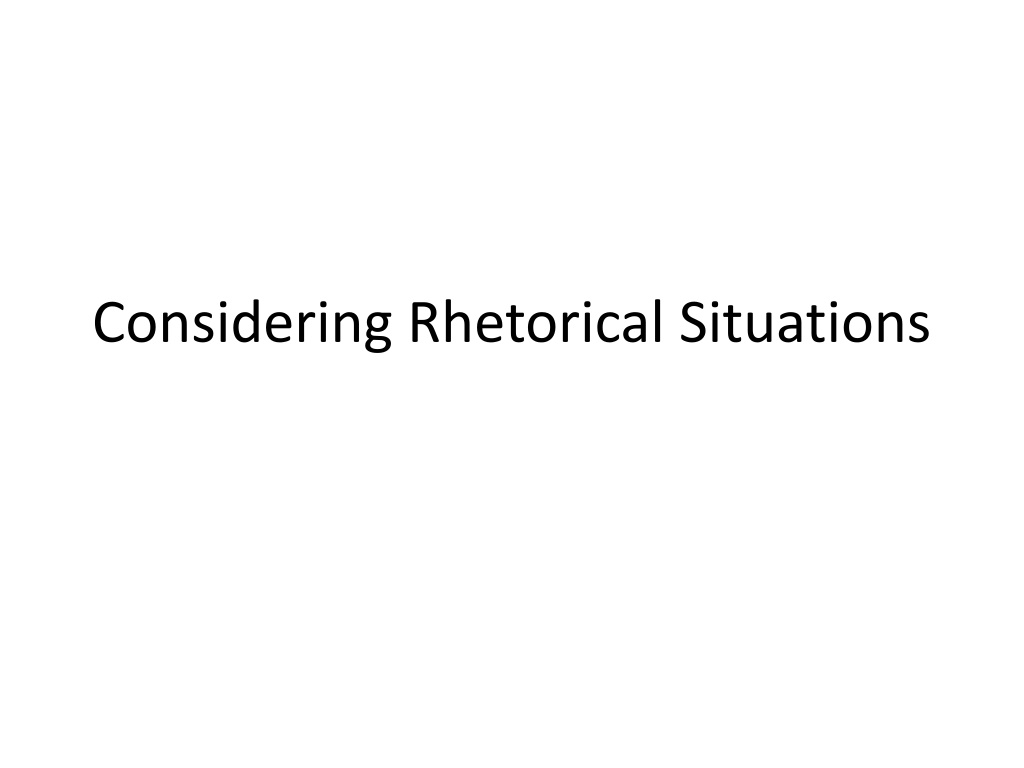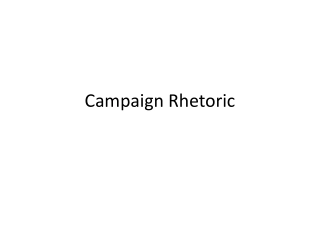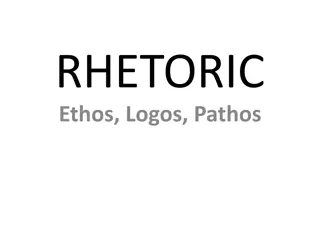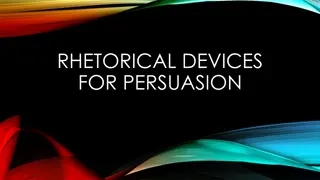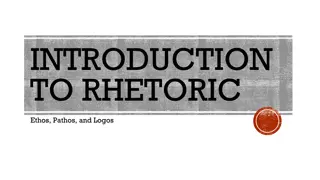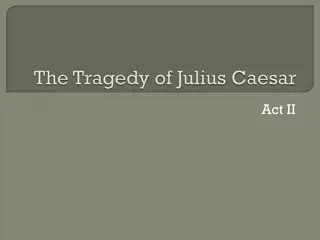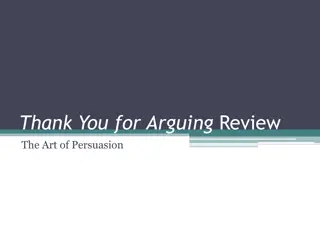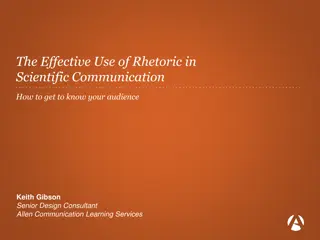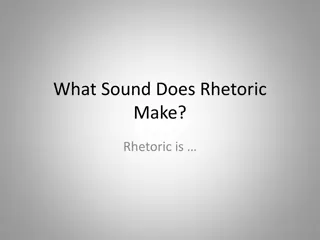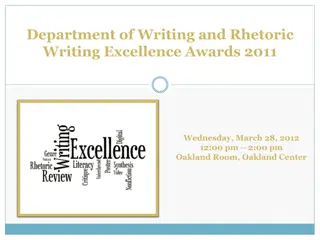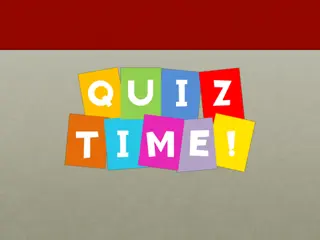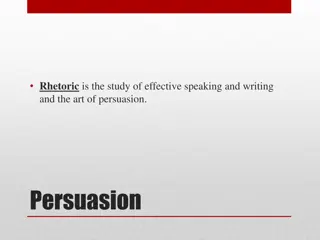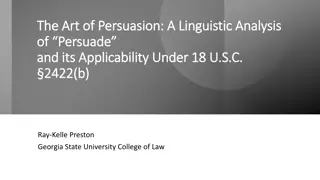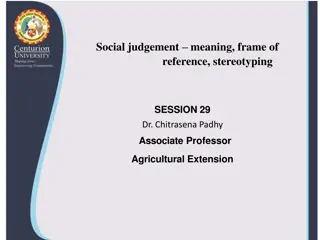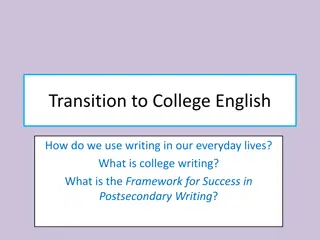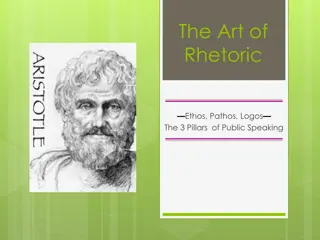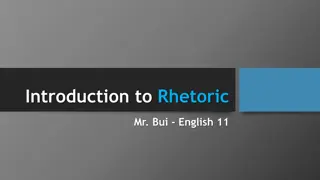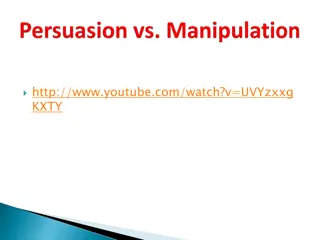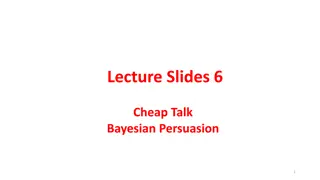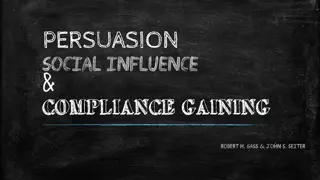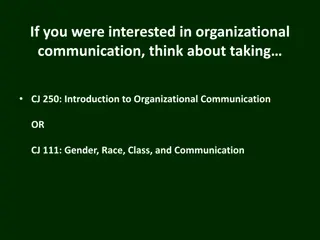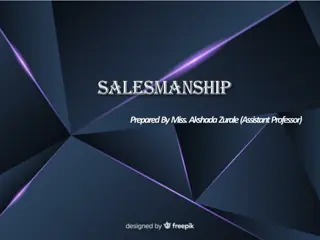Exploring Rhetoric: Understanding the Art of Persuasion and Communication
Delve into the world of rhetoric through insightful discussions on what rhetoric entails, its ethical implications, and the importance of listening and synthesis in college writing. Uncover the power of language and persuasion as a means of effective communication and critical thinking in academic conversations.
Download Presentation

Please find below an Image/Link to download the presentation.
The content on the website is provided AS IS for your information and personal use only. It may not be sold, licensed, or shared on other websites without obtaining consent from the author. Download presentation by click this link. If you encounter any issues during the download, it is possible that the publisher has removed the file from their server.
E N D
Presentation Transcript
Definition of rhetoric 1 : the art of speaking or writing effectively: as a : the study of principles and rules of composition formulated by critics of ancient times b : the study of writing or speaking as a means of communication or persuasion 2 a : skill in the effective use of speech b : a type or mode of language or speech; also : insincere or grandiloquent language Source: Meriam-Webster online dictionary
Quickwrite #2 At the beginning of Ch. 1 of Everyone s an Author, Wayne Booth is quoted as saying, The only real alternative to war is rhetoric. Based on your understanding of what rhetoric is from Ch. 1 and 2, respond to this statement. What does he mean by this? Do you agree? What do the authors of EaA mean when they say that rhetoric is an ethical art? (Note: Ethics is defined as an area of study that deals with ideas about what is good and bad behavior : a branch of philosophy dealing with what is morally right or wrong )
The Academic Conversation Look at the quote from Kenneth Burke on p. 7 of Everyone s an Author. It contains a metaphor that compares writing in an academic setting to coming late to a party where a conversation is already going on. What does this comparison teach us about writing?
Thinking Rhetorically Why do the authors advise us to listen first when thinking rhetorically? (See p. 8 of Everyone s an Author)
Thinking Rhetorically Why do the authors advise us to listen first when thinking rhetorically? (See p. 8 of Everyone s an Author) Note that listening also usually involved reading what other people have said about the topic. Unless you find a recorded interview about the topic, the process of finding out what has been said will mean reading what others have written about it.
In a college setting, writing rhetorically may call for you to Analyze and synthesize information. Evaluate a product or situation. Argue a position. Report on information you have gathered.
A Quote about the word Opinion All opinions are not equal. Some are a very great deal more robust, sophisticated and well supported in logic and argument than others. Douglas Adams When you make claims in your essays and express your opinions, you will want to make sure that those claims are robust (strong) and well-supported by logic.
Analyzing and Synthesizing Information As you think rhetorically, you want to be an analytical reader. Examine the claims the author makes carefully. Pay close attention to how the author supports his or her claims, and use your critical thinking skills to judge the validity of the points. Synthesizing information is one of the most important steps in the writing/research process. It means taking all of the ideas and information you have found, organizing them in a useful way, and adding something new of your own.
The Importance of Imagination The intuitive leap described on p. 13-14 of Everyone s an Author is an example of the power of imaginative thinking combined with careful research. The student had to do the research involved, finding old Sports Illustrated magazines and looking at them carefully. The student also had to trust his instincts when he noticed a difference between old and new covers, figure out what that difference was, and then put it into words. (In this case, the difference was that older magazines focused on teams, newer ones on individual players.) He then had to explore this observation HE had made with examples and analysis. (There s that intellectual curiosity again )
What is a rhetorical situation? A rhetorical situation is the set of specific circumstances in which a writer produces his or her work. These circumstances include Genre (What rhetorical pattern will most help you to accomplish your purpose?) Purpose (What are you trying to accomplish with your writing?) Audience (Who is likely to read your writing?) Stance (tone/attitude) Medium (How is your writing going to be delivered to your audience?) See Ch. 2 of Everyone s an Author for more.
We find ourselves in rhetorical situations every day! What have you written in the past month? Example: Thank you note for iTunes gift card Grandma gave me for my birthday Purpose: express gratitude for gift card, increase probability of getting a good present next year Audience: My grandmother Stance/Tone: Warm, loving, grateful. Medium: Hand-written card.
Rhetorical Situation for Essay #1 What: Narrative essay (a well-told story with a point). Purpose: to tell the story, clearly and vividly, of an event or series of events that had an impact on you, the author, as a reader/writer. Audience: People who have an interest in how others developed as readers/writers. Parents and relatives of children who are in situations similar to yours. Teachers who want to help their students develop as writers and readers. Stance/Tone: Personal, conversational, informative. (You have a lot of freedom here since you are telling a story about your lived experience. Depending on the story you are telling, your tone may be grateful, disappointed, angry, etc.) Medium: Essay typed and uploaded online.
What exactly is a narrative? A narrative is a story with a point. Narrative essays have a distinct beginning, middle, and end, but they are not necessarily written in strict chronological order. (As long as you let your audience know when events happened in relationship to each other, you can skip around in time.) From your textbook p. 104: Narrative essays, especially in college, are meaningful ways of making sense of our experiences, of what s around us and of illustrating a point, making an argument, or reporting information.
What is a Literacy Narrative? Literacy: 1. the quality or state of being literate, esp. the ability to read and write. 2. possession of education: 3. a person's knowledge of a particular subject or field: to acquire computer literacy. Literacy narrative: For this class, a literacy narrative is a narrative that focuses on an event or series of events that has shaped the author as a writer, reader, and literate person, and the way that the author perceives various forms of literacy.
Features of Narrative Essays, p. 108 We will be examining each of these features of narrative writing by analyzing the example provided by the textbook. Please have your book open and follow along with the discussion, as you may be called on to comment on what we just read. Narrative essays contain A clearly identified event A clearly described setting Vivid, descriptive details A consistent point of view A clear point
Context Another thing that a good narrative does it provide the reader with appropriate context. As the writer of a narrative, you want to give the reader enough background information about yourself that they will fully understand the importance of the event to you. It is up to you as a writer to decide how much context you need. Not enough, and the reader might not get why the event mattered. Too much, and you risk the events in the narrative being overshadowed by other facts about your life. Ask yourself: What is the least my readers need to know in order for the importance of the events in this story to make sense?
Change Your narrative will probably (but not definitely) be about an event that changed you, or a person you knew, in some way. We don t usually tell stories about things that stayed the same. If you tell a story and all of the people who appear in the story are exactly the same at the end as they were at the beginning, then what s the point of telling the story? Being able to identify what changed in your literacy narrative can help you to make the change interesting and clear for your audience.
Suggestions for Brainstorming Essay 1 Have you done any Non-Academic/Community related writing, such as a newsletter, blog, Sunday school lesson, or work presentation? Do you write for personal interest? (journals, fiction/poetry/song lyrics for pleasure, internet posts(?)) Does the does your personal history with literacy have any Cross- generational issues? Think about your parents' and family s influence on you attitude towards reading/writing. Are you bilingual or multilingual? What unique experiences and challenges have you had because you have had to navigate two or more languages? What have your experiences with academic writing been like? Think about favorite teachers, difficult essays, successes and failures in school, etc. What role have computers and the internet played in your development as a reader/writer? How has using technology affected how you read and write?
Using Description to Add Detail We did some brainstorming last class. If you remember that, you might want to choose an event that you talked about there for this exercise. I want for you to choose ONE instance that you think tells your reader about your development as a writer. This doesn't have to be the one that you end up writing about, and when you do choose your event, you can do this exercise on your own.
Detail/Description Practice Write your event at the top of a new sheet of paper or document, "The time I read a book on my own," or whatever event it was that you chose. Write about things you remember SEEING. What did the room/house/setting look like? Were there any objects that stick out in your mind? An old table? A worn book's cover? What did the people look like? The description of Mrs. Flowers helps us to picture her in our minds. If there were no other people but you present, describe yourself at that age. Let your reader see you as you saw yourself. Write about things you remember hearing. If you are writing about language, what did the words sound like? What did they make you think of? What were other sounds that formed language associations? Kids yelling down the street, hum of computers, sounds of other languages being spoken, music
Description Practice, Cont. Now, write about things you remember TOUCHING. This is an often neglected sense, but we get so much information from it. What did those new shoes make your feet feel like? What did the pages of the new book feel like? Write about things that you remember smelling/tasting. Smell is our sense that is most closely connected to memory. Use that to your advantage.
